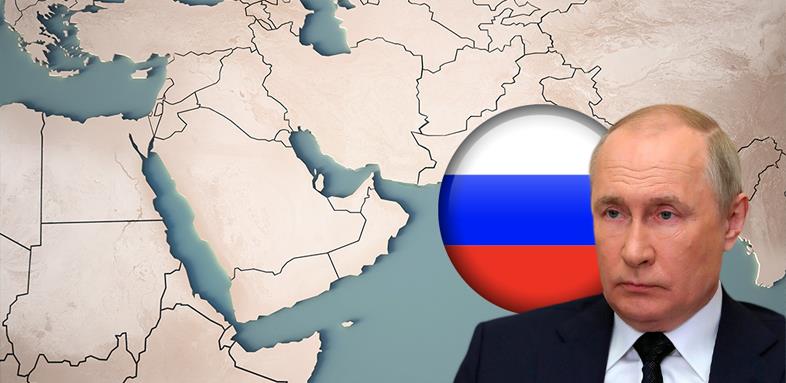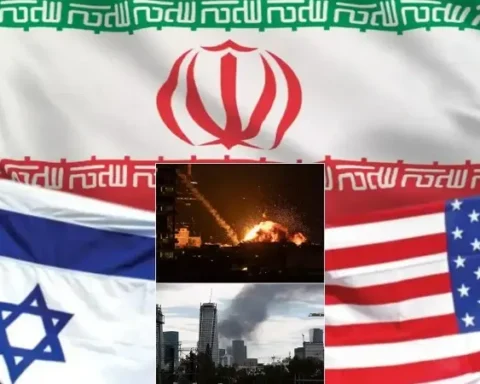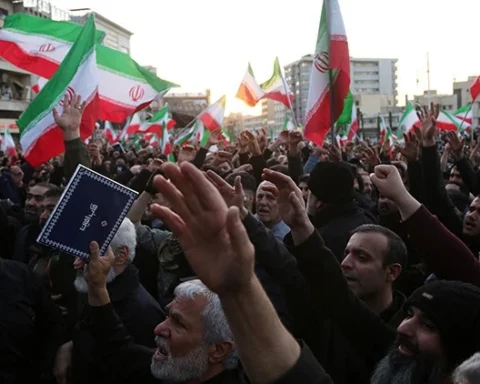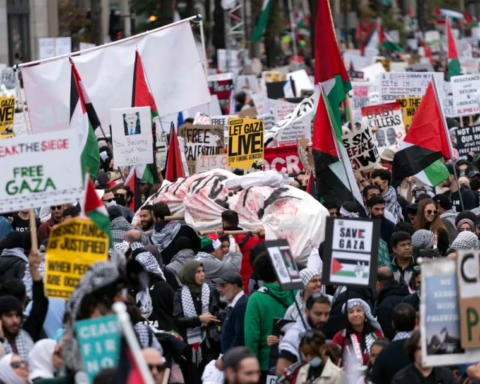Russia’s Allies in the Region Couldn’t Count on Moscow—and Neither Should China
Just a few years ago, Russian President Vladimir Putin seemed to have reasserted Moscow’s influence in the Middle East after decades in which it had waned. As Putin deepened ties with longstanding Russian allies Iran and Syria while nurturing more cordial relationships with Israel and the Arab monarchies, his pragmatic realism seemed to represent a more comfortable alternative to what many countries in the region perceived as the United States’ naïve and destabilizing commitment to promoting democracy.
This strategy allowed Russia to become an important counterweight to the United States in the region, but it also paid dividends closer to home. Leaders in the Middle East were notably quiet in response to Russia’s full-scale invasion of Ukraine in 2022. Not even Israel, a close U.S. ally, criticized Russia, let alone took part in sanctioning it.
But over the past 20 months, Russia’s standing in the Middle East has cratered. Israel’s response to Hamas’s October 7 attacks has devastated the so-called axis of resistance, the Iranian-backed network with which Russia had forged close ties. The Assad regime in Syria, long a valuable Russian client, collapsed spectacularly. U.S. and Israeli strikes against Iranian nuclear facilities severely weakened Russia’s most important regional ally. As a result, Russia’s reputation as a patron and guarantor of security in the region lies in tatters. In the new Middle East now taking shape, Moscow is no longer needed.
Moscow’s failures will resound beyond the Middle East. Whether the result of Putin’s conscious decision not to intervene or of the Kremlin’s inability to do so, Russia’s abandonment of partners in the region should be a sobering lesson for Xi Jinping and the Chinese Communist Party: that in times of crisis, Russia will not be a reliable ally.
For the United States, Russia’s declining influence in the Middle East should also prompt further reflection. For years, policymakers and scholars have debated the strength of the Russian-Chinese bond and whether it made sense to try to drive a wedge between them or encourage their codependence while raising the costs and risks it poses to both countries. But Moscow’s recent setbacks in the Middle East have clarified a basic fact obscured by Chinese and Russian talk of a special relationship. Russia is a fair-weather friend. In the event of a U.S.-Chinese conflict—for example, a fight over Taiwan—Washington can expect Moscow to remain on the sidelines, just as it did its partners in the Middle East.
THE ROAD TO DAMASCUS
After the Soviet Union collapsed, in 1991, Russia ceased to be a major international actor, including in the Middle East. Focused instead on integrating a democratizing Russia into the West, Russian President Boris Yeltsin aspired to join Western institutions such as the G7, the World Trade Organization, and NATO, devoting little effort or resources to maintaining Soviet-era relationships with autocratic adversaries of the United States, such as Iran and Syria. A decade of economic depression further prevented Russia from engaging countries in the region.
Putin, who won the presidency in 2000, gradually ended Moscow’s neglect of the Middle East. After the 9/11 attacks, he quickly embraced U.S. President George W. Bush’s “global war on terror.” To assist the U.S. war effort in Afghanistan, Russia helped the United States open military bases in what Putin considered his sphere of influence, the former Soviet republics of Uzbekistan and Kyrgyzstan. Even as Putin broke with Bush over the invasion of Iraq in 2003 because of Iraqi leader Saddam Hussein’s close ties with Russia, the Russian president continued to work with Washington in the Middle East on issues of mutual interest, most important among them a joint effort to deny Iran a nuclear weapon. In 2010, Russia voted alongside the United States on UN Security Council Resolution 1929, which imposed what were at the time the most comprehensive multilateral sanctions against Tehran. Five years later, Russia joined the United States, along with China, France, Germany, the United Kingdom, and the European Union in signing the Joint Comprehensive Plan of Action. Throughout this period, Russia also cooperated with the United States to fight various terrorist organizations in the region, some of which had close ties with jihadis inside Russia.
The Arab Spring, in 2011, proved to be a turning point for Putin’s Middle East policy. As leaders in the United States and Europe celebrated the fall of dictatorships in the region, Putin, Russia’s prime minister at the time, took a different view of the protests. In meetings with Western leaders, including U.S. President Barack Obama, he warned that the breakdown of autocracy in the Arab world would spark civil wars, empower extremists, and embolden terrorists. He even publicly criticized his protégé, President Dmitry Medvedev, for abstaining from a UN Security Council resolution authorizing the use of force against Libyan strongman Muammar al-Qaddafi’s army, then threatening to commit mass atrocities in Benghazi, Libya’s second-largest city. Putin lambasted the resolution as “defective and flawed,” saying that it “[allowed] everything” and “[resembled] medieval calls for crusades.”
That year, another mass movement against autocracy erupted—in Russia. In December 2011, hundreds of thousands of Russians took to the streets to protest a falsified parliamentary election. Just as he had accused Washington of fomenting revolutions against dictatorships in Egypt, Libya, Syria, and Tunisia, Putin blamed the United States for the demonstrations against his regime. Threats to his rule at home, which Putin genuinely believed were supported by the Obama administration, led the Russian leader to turn away from cooperation with the United States, with significant implications for Russian foreign policy in the Middle East.
Putin’s worries about stability resonated with monarchs in the Middle East, who agreed that regime change in the region would bring to power radical jihadis. Saudi Arabia even intervened militarily in Bahrain to quell antigovernment protests. Putin used the moment to deepen ties with Israel and the Arab monarchies, at a time when their relations with the United States were strained because of U.S. support for political change in the Arab world and perceived rapprochement with Iran. Putin also cultivated a closer relationship with autocratic Egyptian leader Abdel Fattah el-Sisi after he seized power through a coup, in 2013. In addition, Russia filled the void left by the American disengagement in Libya, providing rhetorical and financial support for Field Marshal Khalifa Haftar, the powerful warlord who now controls the eastern part of the country. And when many Western leaders denounced Saudi Crown Prince Mohammed bin Salman after the 2018 assassination of Jamal Khashoggi, a writer who was critical of the Saudi regime, Putin publicly embraced the Saudi ruler.
During this period, Putin also nurtured his personal relationship with Israeli Prime Minister Benjamin Netanyahu, who also feared state breakdown and the rise of Islamist governments and movements in the Arab world. So too, did many conservative Jews who had emigrated from the former Soviet Union to Israel, with whom Russian media channels engaged directly. For them, Putin was a respected, pragmatic leader supporting stability in their neighborhood.
After he won a third term as president in 2012, Putin’s heightened hostility toward the United States as the source of regional and global instability found a particularly sympathetic ear in Iran’s theocratic dictator, Ayatollah Ali Khamenei. Since becoming supreme leader in 1989, Khamenei had moved methodically the regime’s foreign policy toward Russia and China. As Iranian proxy Hezbollah fought alongside Russia’s air force to support Syrian dictator Bashar al-Assad in a brutal civil war, Tehran and Moscow grew still closer. Hamas, which initially took a critical position of Assad regime, ultimately aligned with Iran and Russia. For their part, Putin and the Kremlin never labeled Hamas as a terrorist group, describing them instead as a national liberation movement akin to groups in Latin America, Southeast Asia, and southern Africa that the Soviet Union had supported during the Cold War. That Putin could simultaneously pursue relationships with Israel and Hamas was remarkable, a testament to his successful diplomacy in the Middle East at the time.
A FRIEND TO ALL AUTOCRATS
Putin’s push to expand Russia’s influence in the Middle East initially yielded results. After Russia launched its full-scale invasion of Ukraine in 2022, Iran provided thousands of deadly Shahed drones to support the effort. Arab monarchies have abstained from UN votes criticizing Russia for the invasion and have not joined the international sanctions coalition. In October 2022, Putin and MBS signed an agreement to reduce oil exports, thereby increasing oil prices and funding Russia’s war machine.Even Israel split with most of the democratic world in refraining from criticizing the invasion, voting against a United Nations resolution that condemned Russia’s aggression.
When Assad’s regime in Syria was faltering in 2015, Putin’s deployment of the Russian air force to support Syrian, Iranian, and Hezbollah ground forces bought the Syrian dictator another nine years in power. In exchange for this support, Assad gave Russia continued access to the Tartus naval base and the Khmeimim Air Base (near Latakia), which enhanced Russia’s maritime presence in the Mediterranean Sea, and served as a durable symbol of Russia’s military presence in the Arab Middle East.
Putin’s military intervention in Syria buoyed Russia’s image as a decisive and reliable partner. Unlike the United States, Russia never chastised the region’s autocrats with speeches about democracy and human rights. And Moscow also kept the weapons flowing. In the years after the Arab Spring, Russian arms exports to the Middle East increased, including to Sisi’s Egypt, but also to Turkey, a NATO ally that nonetheless agreed to purchase Russia’s S-400 air defense system.
EVERYTHING EVERYWHERE ALL AT ONCE
After Hamas launched its attack against Israel on October 7, 2023, however, Putin’s strategy began to unravel. Israel launched major military operations in response, first against Hamas in Gaza and then against Hezbollah in Lebanon, devastating both groups’ leadership and command structures. Putin tried to avoid taking a side in the conflict, instead offering to mediate between Hamas and Israel, a gesture that neither Netanyahu nor Israeli society was willing to entertain. But he also offered no significant assistance to Hamas or Hezbollah.
Then, in December 2024, the Assad regime collapsed. Russia’s decades-long investment in supporting the dictatorship crumbled in the span of days. Putin gave Assad and his family asylum in Russia but did nothing to repel rebel forces as they took Damascus. His failure to intervene reverberated throughout the region. Hezbollah was further weakened. Media outlets aligned with the Islamic Revolutionary Guard Corps (IRGC) in Iran publicly complained about Russia’s inability to save their mutual partner.
Russia suffered an even more serious reputational blow in the Middle East when Israeli and U.S. armed forces bombed Iran’s nuclear facilities in June. Just days after the U.S. attack on the Fordow site, Iranian Foreign Minister Abbas Araghchi flew to Moscow seeking support. Putin offered his trademark rhetorical condemnation of the United States but provided no new military aid to Russia’s most stalwart ally in the Middle East, despite Iran’s continued willingness to provide direct military assistance for Russia’s war in Ukraine. Internally, Khamenei and his regime are today weaker than ever, but Putin has offered little to bolster the supreme leader’s position.
FEAR AND LOATHING
Leaders and societies in the Middle East have taken note of Russia’s inaction and indifference in the region. The reaction inside Iran has been particularly pronounced. Khamenei has always been loyal to Moscow, but with his position now weakened, criticism of his embrace of Russia is growing louder. Iranian commentators, once careful and circumspect about questioning Tehran’s relationship with Moscow, now openly lambaste Putin for refusing to include a mutual defense clause in the Russian Treaty on Comprehensive Strategic Partnership signed by Tehran and Moscow in January (similar Russian agreements with Belarus and North Korea contain such clauses). Other voices, including former Iranian Parliament Deputy Speaker Ali Motahari, have criticized Russian delays in providing Iran the S-400 missile defense system that could have helped defend against the Israeli strikes. After the Israeli and U.S. strikes, a lead editorial in an influential newspaper founded by three clerics (including Khamenei) decades ago chastised leaders who steered Iran toward closer ties to Moscow—an unmistakable reference to Khamenei.
So dismayed were some even within the Islamic Revolutionary Guard Corps, often assumed to be a bastion of pro-Russian sympathies, that when Putin offered to mediate between Iran and the United States, a newspaper aligned with the IRGC suggested that the Russian president was really attempting to use Iran to get a better deal with the United States, supporting constraints on Iran’s nuclear program in exchange for U.S. concessions on Ukraine. Commentators on Iranian social media sites now openly discuss the history of Russia’s colonial ambitions in Iran in the tsarist and Soviet eras. The voices of pro-democratic opposition memberslong critical of deepening ties with autocratic Russia have now gained new resonance, both inside Iran and in the diaspora.
Israeli attitudes toward Russia have changed, as well. Neither Netanyahu nor Israeli society appears interested in Putin’s mediating services with Iran. When ties between the United States and Israel have been strained, Netanyahu has leaned toward Moscow. But with Trump back in the White House, Netanyahu’s imperative to remain close to Putin and a weakened Russia has waned.
The official Saudi reaction to Russia’s inaction has been muted. Behind closed doors, MBS is pleased that Iran’s nuclear program has been set back, and that Tehran’s military—especially its missile arsenal—has proved so incapable of inflicting severe damage on Israel or the U.S. military base in Qatar. Putin’s inability or indifference to influence events through either diplomacy or military assistance in the region should compel MBS to rethink his carefully calibrated courtship of the United States, China, and Russia. Before the Israeli strikes, Saudi Arabia and Russia had already clashed over increasing oil output. Riyadh triumphed, and OPEC+ is set to up production in August, to the delight of Washington and the frustration of Moscow.
YOU CAN’T COUNT ON ME
Putin’s decisions not to help Russia’s partners in the Middle East should also send a message to leaders in Beijing about Russia’s value as an ally in the event of war between China and the United States over Taiwan.
If its refusal to support the Iranian regime in its time of greatest vulnerability is any indication, Russia will offer little help to Beijing should it face its own moment of need. Likewise, Moscow’s abandonment of the Assad regime suggests that the Russian armed forces would not join a war against the United States. If a conflict in Asia were to occur, Putin’s support would be limited to continuing to supply China with oil and gas. As Chinese Foreign Minister Wang Yi bluntly stated during a meeting with European leaders, Russia will remain valuable to China so long as it continues to fight in Ukraine, thereby diverting U.S. resources and attention away from Asia. But it cannot be counted on for anything more.
The Trump administration should draw the same conclusion. In the administration’s first months, some analysts argued that the United States needed to peel Russia away from China to help contain Beijing —a “reverse Kissinger” policy. Such a move would have been a bad mistake then, and would be even worse today. Putin has shown Russia to be unreliable even to dictatorships with long-standing relations with Moscow. It would be an even less effective partner for Washington against China. Putin would provide the United States and the democratic world the same resources that he provided the theocrats in Tehran: nothing. So whatever approach Trump ultimately decides to take with Putin, he should set aside the goal of trying to peel Moscow away from Beijing.
The initial success of Moscow’s Middle East strategy once suggested that Russia could be a valuable geopolitical partner. That it eventually failed so completely should dissuade Trump and others from courting its architect.
* MICHAEL MCFAUL is Director of the Freeman Spogli Institute, Professor of Political Science, and a Hoover Fellow at Stanford University. From 2012 to 2014, he served as U.S. Ambassador to Russia. He is the author of the forthcoming book Autocrats vs. Democrats: China, Russia, America, and the New Global Disorder.
* ABBAS MILANI is Hamid and Christina Moghadam Director of Iranian Studies at Stanford University and a research fellow at the Hoover Institution. He is the author of Simorgh: Portraits on my Mind.
Source: https://www.foreignaffairs.com/russia/real-meaning-putins-middle-east-failure-michael-mcfaul






